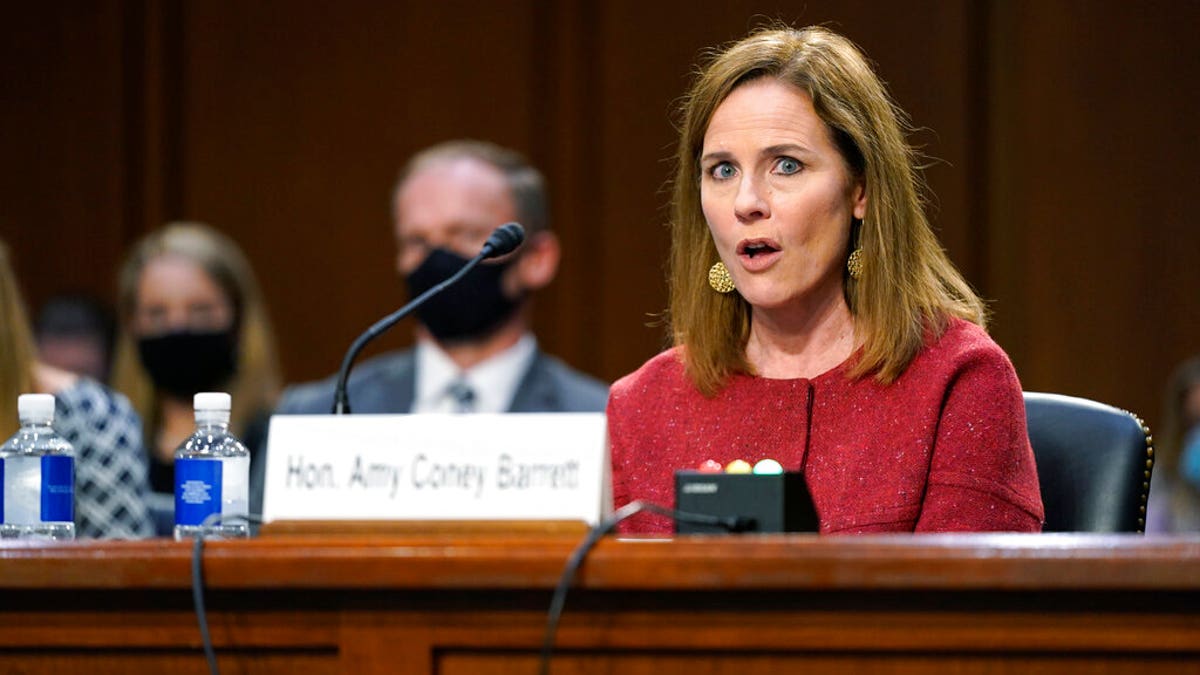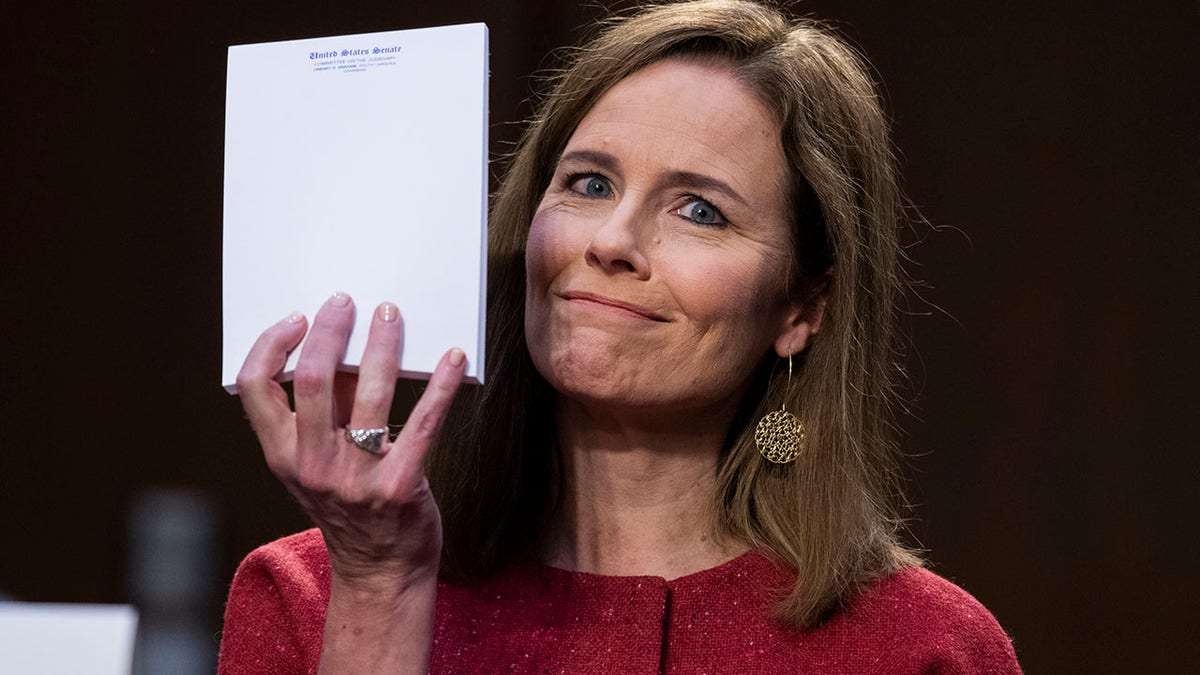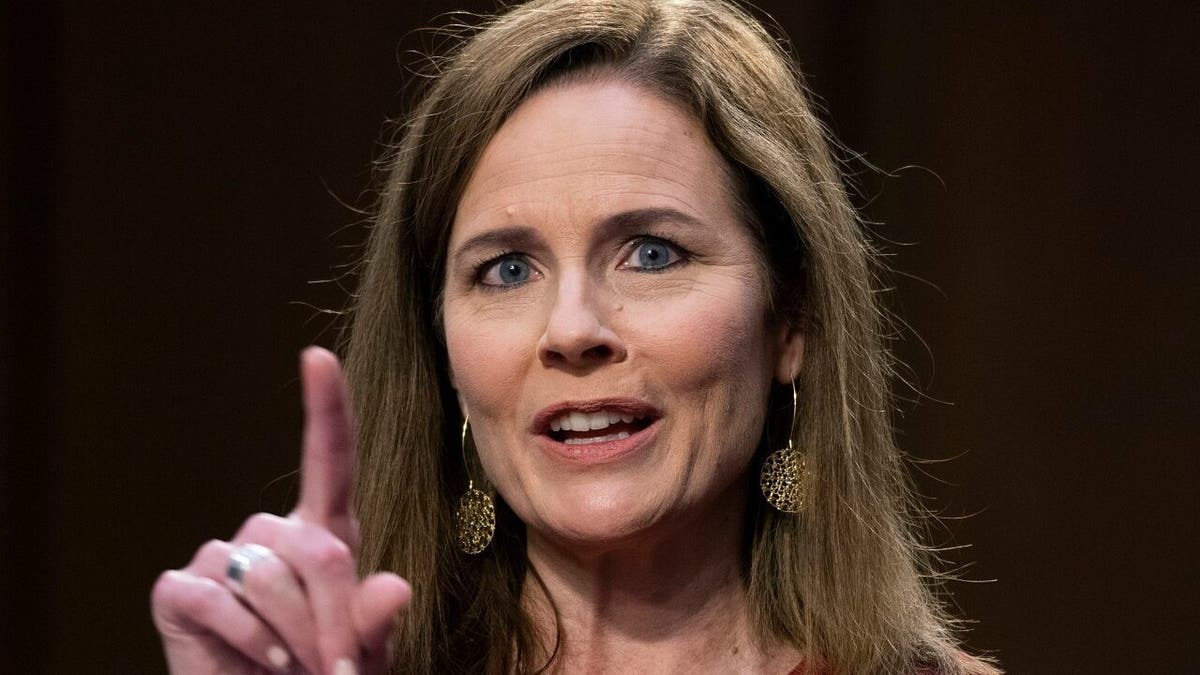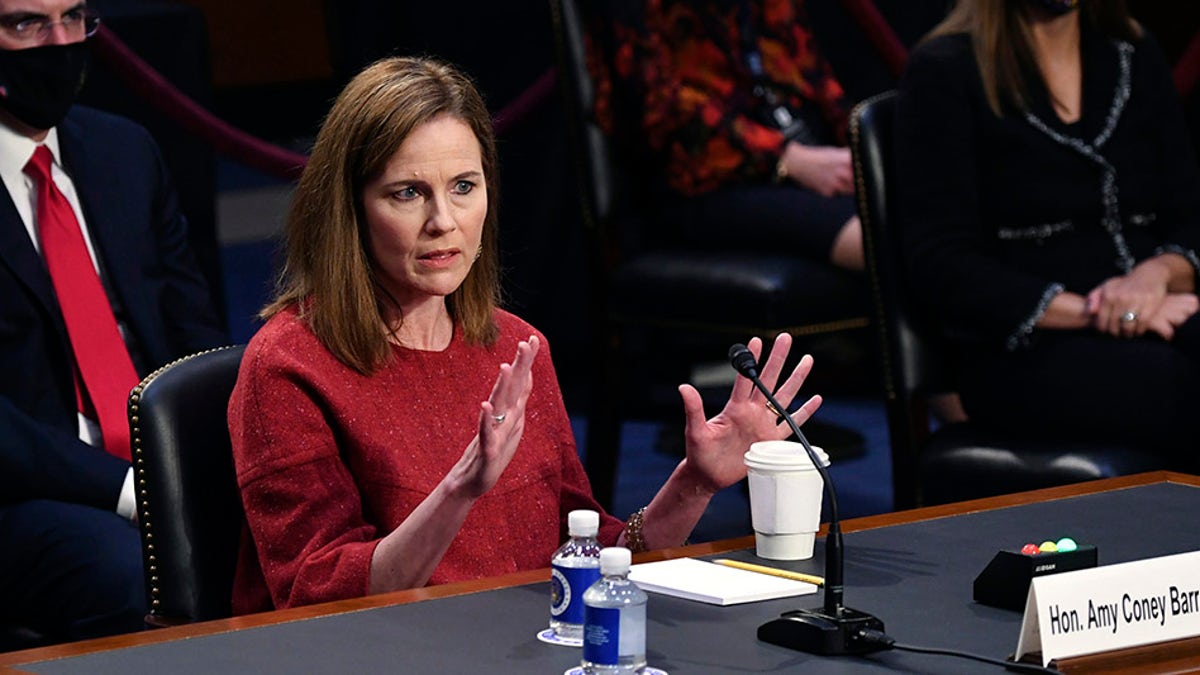Judge Barrett: 'I have no hostility to the ACA or any other law'
Democratic Senator Coons questions the Supreme Court nominee during the confirmation hearing.
Amy Coney Barrett withstood hours of questioning Tuesday with poise, civility, and at times, moments of humanity – countering the portrait of a right-wing extremist that Democrats have attempted to paint of President Trump’s nominee for the Supreme Court, experts argued.
Jeffrey McCall, professor of communication at DePauw University, said Barrett's professional responses and pleasant demeanor have undercut the narrative pushed by Democrats that she is threatening or radical.
"Judge Barrett has had a most impressive day," McCall told Fox News. "It is clear she is bright and sincere. Her poise and pleasant personality make her a natural for the television cameras, which will also make it increasingly difficult for her opponents on the committee to trash her without themselves coming off as uncivil."
Barrett, 48, responded to scholarly legal questions with ease and did so without hesitation. She didn’t bring any files to the hearing and at one point held up a blank pad of paper to reveal that she didn’t take any notes at all.
Through hours of answers, the even-keeled Barrett sought to reassure senators and the American public that she would dispatch justice fairly and independently and she’d come to each case without any political agenda.
“Judges can’t just wake up one day and say, ‘I have an agenda. I like guns, I hate guns. I like abortion, I hate abortion,’ and walk in like a royal queen and impose their will on the world. You have to wait for cases and controversies, which is the language of the Constitution, to wind their way through the process,” Barrett said.

Supreme Court nominee Amy Coney Barrett speaks during a confirmation hearing before the Senate Judiciary Committee, Tuesday, Oct. 13, 2020, on Capitol Hill in Washington. Her family looks on at left. (AP Photo/Patrick Semansky, Pool)
Democrats have driven home the message that Barrett was picked to fulfill the longstanding political goal of congressional Republicans and President Trump of overturning the Affordable Care Act. If confirmed, she could be in place for the Nov. 10 hearing on the future of the law, known as Obamacare, and Barrett has made comments in the past that were critical of the Supreme Court upholding the law in previous cases.
Democrats came armed with pictures on poster boards of children and Americans with preexisting conditions and shared their moving stories to Barrett to drive home the point that healthcare is on the docket in November.
While Barrett repeatedly declined to say whether she would recuse herself from certain cases or how she’d rule on matters – which is common practice for Supreme Court nominees – she told senators she has no agenda and made no commitments to Trump.
“I'm not here on a mission to destroy the Affordable Care Act. I'm just here to apply the law and adhere to the rule of law,” Barrett said.

Supreme Court nominee Amy Coney Barrett holds up her notepad as she speaks during her confirmation hearing before the Senate Judiciary Committee on Capitol Hill in Washington, Tuesday, Oct. 13, 2020. (Tom Williams/Pool via AP)
McCall said Barrett responded to accusatory questioners with clarity.
"She has been able to come off as smart and professorial, but without being pompous or aloof. She is fully up to the challenges of these hearings thus far, and demonstrates the temperament that most Americans should want in a Supreme Court justice," McCall said. "It has been quite difficult for the antagonists on the committee to paint Barrett as threatening or radical, so Barrett seems to be winning the rhetorical battle, both in terms of arguments and television image."
BARRETT SAYS ROE V. WADE IS NOT A 'SUPER PRECEDENT' THAT CANNOT BE OVERTURNED
Sen. Ben Sasse, R-Neb., made note of the portrayals that Barrett has faced.
"I've been amazed at how many times the argument is: American people: be really, really scared, the person sitting before us obviously hates people and wants sick people to die and not have health care coverage," Sasse said.
While Barrett considers the late Justice Antonin Scalia a mentor and said she prescribes the same judicial philosophy, the judge told senators just because Scalia, a conservative icon, ruled one way -- including twice to dismantle the Affordable Care Act -- it's not fair to assume that she would decide the same.
"You would not be getting Justice Scalia," Barrett said. "You would be getting Justice Barrett."
Some Democrats have described Barrett as a "radical" who was handpicked by Trump to take away healthcare from sick Americans in time for the Nov. 10 Supreme Court case. In the days leading up the hearing, Democrats have also warned that Barrett would do Trump's bidding, including taking away abortion rights and deciding a potential contested presidential election in his favor.
“Judge Barret, your nomination for a lifetime appointment to the highest court in the land comes before us under a cloud,” Sen. Dick Durbin, D-Ill., said Monday. “You have been nominated by a president who shows contempt for the Constitution, but does not hesitate to tell his loyal followers that you are being sent to the bench to do his political chores—abolish the ACA, rule in his favor in an election contest, and even more.”
But over hours of questioning on Tuesday, Barrett remained poised and steady. Without giving definitive answers to questions of recusal or specific cases -- citing the so-called Ginsburg rule -- Barrett carefully chipped away at the extremist narrative of her record and with the help of friendly questions from GOP senators, like Sen. Ted Cruz, R-Texas, she had a chance to humanize herself.
BARRETT SAYS SHE IS NOT 'HOSTILE' TO OBAMACARE
Barrett, a mother of seven, described the challenges of her children's online learning during the pandemic, how she helps them practice the piano and lamented how she's lost her French language skills over time.

Supreme Court nominee Amy Coney Barrett speaks during her confirmation hearing before the Senate Judiciary Committee on Capitol Hill in Washington, Tuesday, Oct. 13, 2020. (Tom Williams/Pool via AP)
And when Sen. Dianne Feinstein, D-Calif, marveled about how well-behaved her children were, six of whom were sitting behind her, Barrett quipped: “I have eyes in the back of my head."
Barrett condemned racism and discrimination. The jurist, a mom of two adopted Black children from Haiti, said her family was moved to tears by the video of George Floyd's death in Minneapolis: "We wept together in my room."
Barrett is a practicing Roman Catholic and has been actively anti-abortion in her private life, but told the committee that she would not impose her personal beliefs on her legal rulings.
"My life experiences ... don't dictate how I decide cases," Barrett said.
Sen. Kelly Loeffler, R-Ga., praised Barrett's poise throughout the marathon hearing that extended well into the evening.
“Even in the midst of attacks by Democrats, Judge Amy Coney Barrett has shown poise and positivity and proven her track record as a highly-qualified jurist," Loeffler told Fox News. "I'm confident Judge Barrett will be an originalist who will uphold the Constitution and apply the law as it was written, and I look forward to voting to confirm her as the next associate justice of the Supreme Court without delay.”
BARRETT WON'T COMMIT TO RECUSING HERSELF FROM OBAMACARE CASE, SAYS SHE WOULD FOLLOW RULES
Carl Tobias, the Williams Chair in Law at the University of Richmond, said despite the extremely partisan nature of the hearings, Barrett handled the rhetorical and even personal questions with respect and care.
"I think that Judge Barrett’s responses to most questions that senators posed were articulate, cautious, clear, patient, and respectful, while they suggested that she has balanced judicial temperament," Tobias told Fox News.
He added: "She seemed unfazed and calm in the face of some difficult and even inappropriate questions from senators on both sides of the aisle. Unfortunately, the stilted, staged and extremely partisan nature of the hearing complicated efforts to elucidate her views on many critical issues that she might address as a Justice."

Supreme Court nominee Amy Coney Barrett speaks during a confirmation hearing before the Senate Judiciary Committee, Tuesday, Oct. 13, 2020, on Capitol Hill in Washington. (Kevin Dietsch/Pool via AP)
This week's hearing has been anything but conventional as it is being held just days before a presidential election and in the midst of the coronavirus pandemic that had infected two members of the Judiciary Committee as well as the president. Democrats have unsuccessfully asked for the hearing to be delayed until the people decide the election -- the stance of Republicans four years ago who held up President Obama's election-year nominee of Merrick Garland.
But despite the unparalleled times for the nomination, the exchanges between senators and Barrett were measured and at times seemed like a traditional debate of legal ideas -- albeit amid the backdrop of a hearing room with masked senators and hand sanitizing stations.
The last time the Senate Judiciary Committee held a high court confirmation hearing was for the highly controversial nomination of Justice Brett Kavanaugh, who was accused of sexual assault by Dr. Christine Blasey Ford and two other women. The accusations sparked nationwide outrage, especially among progressive women, while Republican senators and Trump lined up to defend Kavanaugh and decried a "witch hunt."
CLICK HERE TO GET THE FOX NEWS APP
Sen. Lindsey Graham, R-S.C., delivered a heated breakout speech in 2018 in defense of Kavanaugh and lambasted Democrats for the "sham" attacks on the jurist. But this time around, Graham marveled at the civility of the hearing and the non-combative nature of Barrett's exchanges with senators.
"This is the way that it should be," Graham, the chairman of the Senate Judiciary Committee, said.















































